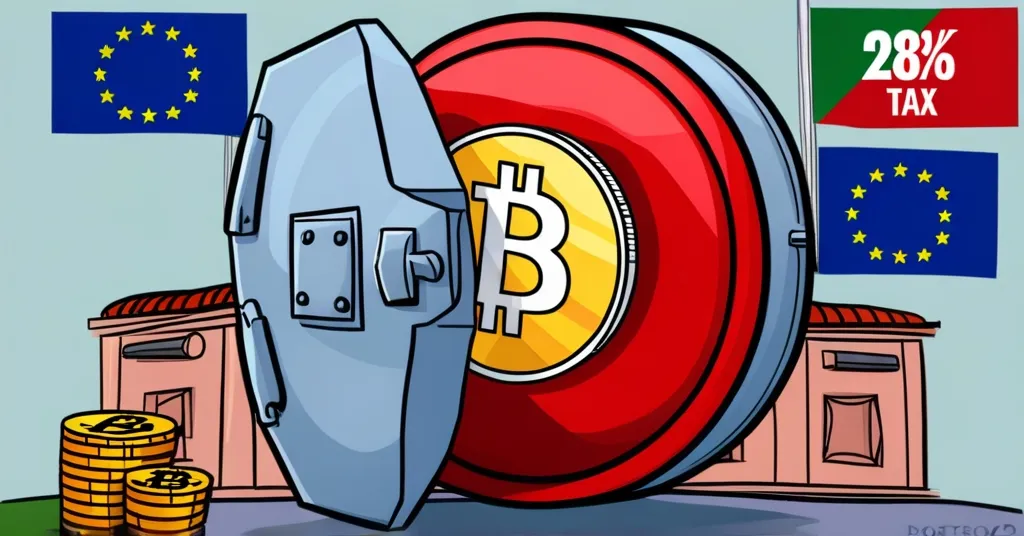Portugal’s BiG Bank Blocks Crypto Transfers Amid EU’s Tightening Regulations

Portugal’s Bank Slams the Door on Crypto Transfers Amid EU’s Tightening Grip
Portugal’s largest bank, Banco de Investimentos Globais (BiG), has unexpectedly blocked fiat transfers to cryptocurrency platforms, aligning with the European Union’s new anti-money laundering and counter-terrorism financing regulations. This move marks a departure from Portugal’s previously crypto-friendly stance, with the introduction of a 28% capital gains tax on short-term crypto holdings shaking the foundations of what was once a crypto haven.
- BiG blocks fiat transfers to crypto platforms
- Aligns with EU’s anti-money laundering and terrorism financing regulations
- Portugal introduces 28% capital gains tax on short-term crypto holdings
- EU’s Markets in Crypto-Assets Regulation (MiCA) in effect
Portugal, once the darling of the crypto world due to its tax-friendly policies, is now playing hard to get. The introduction of a 28% tax on profits from cryptocurrencies held for less than a year, coupled with BiG’s decision to block traditional currency movements—known as fiat transfers—to crypto platforms, signals a significant shift. This change comes as the EU implements the Markets in Crypto-Assets Regulation (MiCA), a comprehensive framework designed to standardize the regulation of digital assets across member states.
BiG’s move, while not yet a national trend, highlights the growing regulatory pressure within Portugal. This pressure stems not only from the EU but also from national authorities like the Bank of Portugal and the European Central Bank. The decision reflects broader global concerns about the risks associated with digital assets, including their potential use in illicit activities.
However, not all Portuguese banks are slamming the door on crypto. Caixa Geral de Depósitos, for instance, continues to allow fiat transfers to crypto platforms, showing that Portugal’s banking sector is not unified in its approach. This diversity mirrors the varied regulatory landscape across Europe, where some countries like the Czech Republic and Switzerland embrace cryptocurrencies, while others adopt a more restrictive stance.
Critics, including Portuguese crypto entrepreneur José Maria Macedo, have raised their voices against BiG’s decision:
Critics, including Portuguese crypto entrepreneur José Maria Macedo, have expressed concern that such restrictive measures could push users toward decentralized finance (DeFi).
Macedo’s critique, echoing a Bitcoin maximalist sentiment, underscores the potential for such regulations to drive users towards DeFi—a realm of financial services built on blockchain technology, bypassing traditional financial intermediaries. This shift could lead to increased activity in the decentralized space, potentially fostering innovation but also raising new regulatory challenges.
The EU’s MiCA aims to provide a unified regulatory framework for digital assets, which includes transitional measures allowing crypto-asset service providers to continue operations until they receive authorization. However, the full implementation of MiCA in Portugal awaits the publication of national law, indicating a delay in the process.
The diverse approaches to cryptocurrency regulation across Europe highlight the ongoing debate about integrating digital assets into the financial system. While countries like El Salvador have embraced Bitcoin as legal tender, others, like Portugal, are navigating a more cautious path, balancing innovation with security.
Portugal’s regulatory shift raises several key questions and takeaways:
- What prompted Banco de Investimentos Globais (BiG) to block fiat transfers to cryptocurrency platforms?
BiG’s decision aligns with new European Union regulations focused on combating money laundering and terrorism financing.
- How does Portugal’s crypto policy compare to its previous stance?
Portugal has shifted from being a crypto haven to introducing a 28% capital gains tax on short-term crypto holdings and allowing BiG to block fiat transfers, marking a departure from its earlier crypto-friendly policies.
- What is the European Union’s Markets in Crypto-Assets Regulation (MiCA)?
MiCA is a regulatory framework implemented by the EU to standardize the regulation of digital assets across its member states, aiming to provide clarity and compliance within the crypto space.
- What are the potential implications of BiG’s restrictions on users and the crypto ecosystem in Portugal?
Critics fear that such restrictions could drive users toward decentralized finance (DeFi) and push crypto activity underground, reflecting broader global concerns about digital asset risks.
- How do crypto regulations vary across Europe?
Regulations vary widely; some countries like the Czech Republic and Switzerland embrace cryptocurrencies, while others, like BiG in Portugal, implement restrictions, showcasing the diverse regulatory landscape in Europe.
The evolving regulatory landscape in Portugal and across Europe presents a complex challenge. While some see these regulations as necessary steps to safeguard the financial system, others view them as potential barriers to innovation and growth in the crypto sector. As Portugal navigates this new terrain, the global crypto community will watch closely to see how these policies impact the adoption and development of digital assets.



